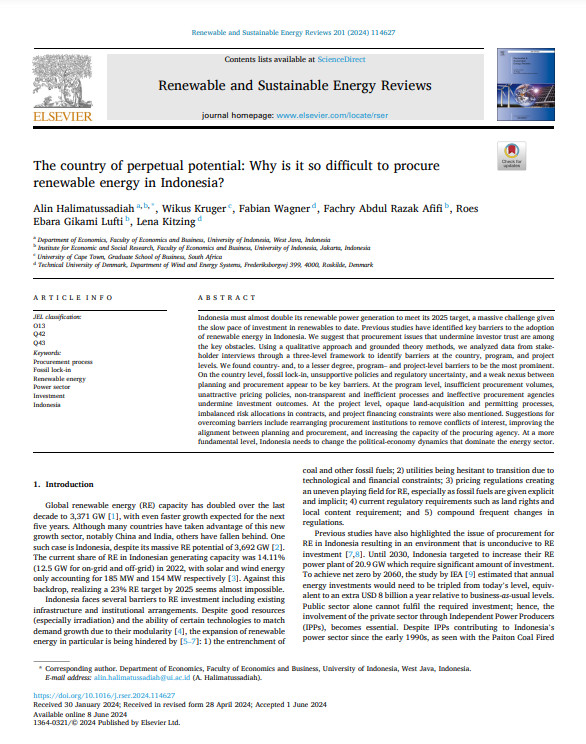
Keyword(s)
Author(s)
Alin Halimatussadiah, Wikus Kruger, Fabian Wagner, Fachry Abdul Razak Afifi, Roes Ebara Gikami Lutfi, Lena Kitzing
Country(ies)
Publisher
Published Date
Access
DOI
Department of Economics, Faculty of Economics and Business, University of Indonesia, West Java, Indonesia
Institute for Economic and Social Research, Faculty of Economics and Business, University of Indonesia, Jakarta, Indonesia
University of Cape Town, Graduate School of Business, South Africa
Technical University of Denmark, Department of Wind and Energy Systems, Frederiksborgvej 399, 4000, Roskilde, Denmark”
Indonesia must almost double its renewable power generation to meet its 2025 target, a massive challenge given the slow pace of investment in renewables to date. Previous studies have identified key barriers to the adoption of renewable energy in Indonesia. We suggest that procurement issues that undermine investor trust are among the key obstacles. Using a qualitative approach and grounded theory methods, we analysed data from stakeholder interviews through a three-level framework to identify barriers at the country, program, and project levels. We found country- and, to a lesser degree, program– and project-level barriers to be the most prominent. On the country level, fossil lock-in, unsupportive policies and regulatory uncertainty, and a weak nexus between planning and procurement appear to be key barriers. At the program level, insufficient procurement volumes, unattractive pricing policies, non-transparent and inefficient processes and ineffective procurement agencies undermine investment outcomes. At the project level, opaque land-acquisition and permitting processes, imbalanced risk allocations in contracts, and project financing constraints were also mentioned. Suggestions for overcoming barriers include rearranging procurement institutions to remove conflicts of interest, improving the alignment between planning and procurement, and increasing the capacity of the procuring agency. At a more fundamental level, Indonesia needs to change the political-economy dynamics that dominate the energy sector.